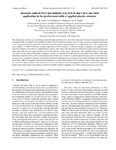Research skills R+D+I and industry 4.0, STEM and TRIZ and theirapplication in the professional skills of applied physics students

Use este enlace para citar
http://hdl.handle.net/2183/41335
A non ser que se indique outra cousa, a licenza do ítem descríbese como Creative Commons Attribution-NonCommercial-NoDerivatives 4.0 International License
Coleccións
Metadatos
Mostrar o rexistro completo do ítemTítulo
Research skills R+D+I and industry 4.0, STEM and TRIZ and theirapplication in the professional skills of applied physics studentsAutor(es)
Data
2024Cita bibliográfica
Coello Pisco, S. M., Rodríguez, B., Banguera, L. and Baidal, E. (2024) “Research skills R+D+I and industry 4.0, STEM and TRIZ and their application in the professional skills of applied physics students”, Revista Mexicana de Física E, 21(1 Jan-Jun), pp. 010212 1–. https://doi.org/10.31349/RevMexFisE.21.010212
Resumo
[Abstract] The advancement of science and technology requires that future professionals in all fields of study have developed certain professional andinvestigative skills. The impact of the industrial revolution 4.0 has included the education sector. For these reasons, we designed a chart basedon five competencies that are essential for the professional improvement of future graduates of the Engineering career. These competencieswere: industry 4.0, TRIZ, STEM and research competencies in R+D+I projects. A didactic material was prepared to be applied to 225basic level students in the subject of Applied Physics together with a rubric that determines the skills that the participants have developedduring their study from the upper secondary level to the basic level of the career. engineering. The quantitative analysis of the studywas carried out with inferential descriptive statistics, in which we found that the students have not developed certain skills: social skills,leadership, cooperative work, assertive communication, demotivation, lack of interest in contributing ideas in group work, no they know howto assign roles. A qualitative technique of motivational didactic development (survey of previous motivations, prejudices and feelings) andthe inventive TRIZ were applied to promote the development of certain skills in students. The qualitative analysis of the study was carriedout with the Chi Square technique, the results of our research confirm that the didactic-pedagogical-experimental technique has a significantimpact on the improvement or development of professional skills in students regardless of the skills acquired in previous years’ levels.
Palabras chave
R+D+I investigative skills
Industry 4.0 skills
STEM skills
TRIZ
Motivational support technique
Professional skills
Industry 4.0 skills
STEM skills
TRIZ
Motivational support technique
Professional skills
Versión do editor
Dereitos
Creative Commons Attribution-NonCommercial-NoDerivatives 4.0 International License
Ítems relacionados
Mostrando ítems relacionados por Título, autor ou materia.
-
Varieties of Capitalism and Labour Market Opportunities for the Youth: A Comparison of Attitudes Towards Skill Formation
Hörisch, Felix; Tosun, Jale; Erhardt, Julian; Maloney, William (Universidade da Coruña, 2020-12-18)[Abstract] In this study, we examine the extent to which socio-economic institutions shape young people’s perceptions of labour market opportunity structures and their employment attitudes (i.e. skills and retraining). ... -
Motor Development among Spanish Preschool Children
Honrubia-Montesinos, Cristina; Gil-Madrona, Pedro; Losada-Puente, Luisa (2021)[Abstract] The purpose of this study was to analyze motor development of Spanish preschoolers, taking into account sex and age, being an only child, prematurity, and the practice of extracurricular activities. The sample ... -
Factores que influyen en la motricidad gruesa de niños y niñas con discapacidad visual: revisión de la literatura
Domínguez Álvarez, Laura; Barcala-Furelos, Roberto; Peixoto-Pino, Lucía; Rico-Díaz, Javier (Universidade da Coruña, 2021-12-27)[Resumen] Los niños y niñas con discapacidad visual padecen retrasos en el desarrollo motor. La intervención y estimulación motriz desde la primera infancia puede atenuar el déficit motor y contribuir a un estilo de vida ...






